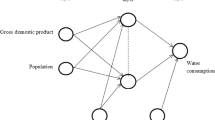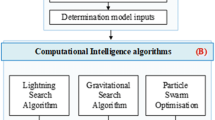Abstract
Accurate and reliable forecasting plays a key role in the planning and designing of municipal water supply infrastructures. Recent studies related to water demand prediction have shown that water demand is driven by weather variables, but the results do not clearly show to what extent. The principal aim of this research was to better understand the effects of weather variables on water demand. Additionally, it aimed to offer an appropriate and reliable technique to predict municipal water demand by using the Gravitational Search Algorithm (GSA) and Backtracking Search Algorithm (BSA) with Artificial Neural Network (ANN). Moreover, eight weather factors were adopted to evaluate their impact on the water demand. The principal findings of this research are that the hybrid GSA-ANN (Agent = 40) model is superior in terms of fitness function (based on RMSE) for yearly and seasonal phases. In addition, it is evidently clear from the findings that the GSA-ANN model has the ability to simulate both seasonal and yearly patterns for daily data water consumption.






Similar content being viewed by others
References
Adamowski JF (2008) Peak daily water demand forecast modeling using artificial neural networks. J Water Resour Plan Manag 134:119–128
Adamowski J, Fung Chan H, Prasher SO, Ozga-Zielinski B, Sliusarieva A (2012) Comparison of multiple linear and nonlinear regression, autoregressive integrated moving average, artificial neural network, and wavelet artificial neural network methods for urban water demand forecasting in Montreal, Canada. Water Resour Res 48:1–14
Ahmed M, Mohamed A, Homod R, Shareef H (2016) Hybrid LSA-ANN based home energy management scheduling controller for residential demand response strategy. Energies 9:716
Ahmed MS, Mohamed A, Khatib T, Shareef H, Homod RZ, Ali JA (2017) Real time optimal schedule controller for home energy management system using new binary backtracking search algorithm. Energy Build 138:215–227
ASCE Task Committee (2000) Artificial neural networks in hydrology. I: preliminary concepts. Journal of Hydrologic Egineering. ASCE Task Committee
Babel MS, Shinde VR (2011) Identifying prominent explanatory variables for water demand prediction using artificial neural networks: a case study of Bangkok. Water Resour Manag 25:1653–1676
Bakker M, Van Duist H, Van Schagen K, Vreeburg J, Rietveld L (2014) Improving the performance of water demand forecasting models by using weather input. 12th International Conference on Computing and Control for the Water Industry, 1–1-2014. 93–102
Basheer IA, Hajmeer M (2000) Artificial neural networks: fundamentals, computing, design, and application. J Microbiol Methods 43:3–31
Behboudian S, Tabesh M, Falahnezhad M, Ghavanini FA (2014) A long-term prediction of domestic water demand using preprocessing in artificial neural network. J Water Supply Res Technol AQUA 63:31–42
Bougadis J, Adamowski K, Diduch R (2005) Short-term municipal water demand forecasting. Hydrol Process 19:137–148
Chen D, Zou F, Lu R, Wang P (2017) Learning backtracking search optimisation algorithm and its application. Inf Sci 376:71–94
Donkor EA, Mazzuchi TH, Soyer R, Roberson JA (2014) Urban water demand forecasting: review of methods and models. J Water Resour Plan Manag 140:146–159
Firat M, Yurdusev MA, Turan ME (2009) Evaluation of artificial neural network techniques for municipal water consumption modeling. Water Resour Manag 23:617–632
Firat M, Turan ME, Yurdusev MA (2010) Comparative analysis of neural network techniques for predicting water consumption time series. J Hydrol 384:46–51
Fogden J, Wood G (2009) Access to Safe Drinking Water and Its Impact on Global Economic Growth. HaloSource Inc
Gato S, Jayasuriya N, Hadgraft R (2005) A simple time series approach to modelling urban water demand. Aust J Water Resour 8:153–164
Gharghan SK, Nordin R, Ismail M (2016a) A Wireless Sensor Network with Soft Computing Localization Techniques for Track Cycling Applications. Sensors (Basel), 16
Gharghan SK, Nordin R, Ismail M, Ali JA (2016b) Accurate wireless sensor localization technique based on hybrid pso-ann algorithm for indoor and outdoor track cycling. Ins Electric Electron Eng Sensors J 16:529–541
Jain A, Ormsbee LE (2002) Short-term water demand forecast modeling techniques conventional methods versus AI. Am Water Works Assoc 94:64–72
Jain A, Varshney AK, Joshi UC (2001) Short-term water demand forecast modelling at IIT Kanpur using artificial neural networks. Water Resour Manag 15:299–321
Kotsiantis SB, Kanellopoulos D, Pintelas PE (2006) Data preprocessing for supervised leaning. Int J Comput Sci 1:111–117
Liu J, Savenije HHG, Xu J (2003) Forecast of water demand in Weinan City in China using WDF-ANN model. Phys Chem Earth, Parts A/B/C 28:219–224
Maier HR, Dandy GC (2000) Neural networks for the prediction and forecasting of water resources variables: a review of modelling issues and applications. Environ Model Softw 15:101–124
Pallant J (2011) SPSS SURVIVAL MANUAL: a step by step guide to data analysis using SPSS. Australia, Allen & Unwin
Payal A, Rai CS, Reddy BVR (2015) Analysis of some feedforward artificial neural network training algorithms for developing localization framework in wireless sensor networks. Wirel Pers Commun 82:2519–2536
Rashedi E, Nezamabadi-Pour H, Saryazdi S (2009) GSA: a gravitational search algorithm. Inf Sci 179:2232–2248
Sarker RC, Gato S, Imteaz M (2013) Temperature and rainfall thresholds corresponding to water consumption in Greater Melbourne, Australia. 20th International Congress on Modelling and Simulation, 1–6 December 2013 Adelaide, Australia. Modelling and Simulation Society of Australia and New Zealand, 2576–2582
Shahin MA, Jaksa MB, Maier HR (2008) State of the art of artificial neural networks in geotechnical engineering. Electron J Geotech Eng 13:1–26
Shuaib M, Kalavathi SM, Rajan CA, C. (2015) Optimal capacitor placement in radial distribution system using gravitational search algorithm. Int J Electr Power Energy Syst 64:384–397
Su Z, Wang H, Yao P (2016) A hybrid backtracking search optimization algorithm for nonlinear optimal control problems with complex dynamic constraints. Neurocomputing 186:182–194
Tabachnick BG, Fidell LS (2013) Using Multivariate Statistics, United States of America, Pearson Education, Inc
Xiong H, Pandey G, Steinbach M, Kumar V (2006) Enhancing data analysis with noise removal. Inst Electric Electron Eng Trans Knowl Data Eng 18:304–319
YVW (2017) Yarra Valley Annual Report Water 2016–2017. Australia
Zhang JJ, Song R, Bhaskar NR, French MN (2006) Short-term water demand forecasting: a case study. 8th Annual Water Distribution Systems Analysis Symposium, August 27–30, 2006 Cincinnati, Ohio, USA. United States, 1–14
Zhoua SL, McMahon TA, Walton A, Lewis J (2000) Forecasting daily urban water demand: a case study of Melbourne. J Hydrol 236:153–164
Acknowledgements
The Iraqi Ministry of Higher Education and Scientific Research, Wasit University supported this project. I thank Peter Roberts, the Demand Forecasting Manager, Yarra Valley Water for providing all data.
Author information
Authors and Affiliations
Corresponding author
Ethics declarations
Conflict of Interest
None.
Rights and permissions
About this article
Cite this article
Zubaidi, S.L., Gharghan, S.K., Dooley, J. et al. Short-Term Urban Water Demand Prediction Considering Weather Factors. Water Resour Manage 32, 4527–4542 (2018). https://doi.org/10.1007/s11269-018-2061-y
Received:
Accepted:
Published:
Issue Date:
DOI: https://doi.org/10.1007/s11269-018-2061-y




